Dentures – Juno Beach, FL
Complete Restore Your Smile After Advanced Tooth Loss
Who’s a Good Candidate for Dentures?

Many patients believe that dentures are only for specific people, like those over 60 or others who have lost all their teeth. However, no matter your age or how many pearly whites you’re missing, dentures are for anyone who needs them! Scheduling a consultation with Dr. Riley or Dr. Keuning will help you decide if these wonderful prosthetics are right for you. If you want to know more about the type of patient who typically receives dentures, read more below.
Effects of Missing Teeth

Tooth loss affects far more than just the ascetics of your smile. The structure from crown to root is an important part of the function of your mouth from chewing and speaking to maintaining a healthy jaw. The more teeth you’re missing, the greater the effect on your daily life and your appearance. Some of the consequences of lost teeth include:
- Facial Sagging: As your jawbone deteriorates, the muscles in your face lose support.
- Speech Impediments: Missing teeth affect both tongue placement and your ability to manipulate air for various sounds.
- Lowered Self-Esteem: Large gaps in your smile can detract from your appearance and cause anxious or self-deprecating feelings.
- Difficulties Eating: Without the ability to chew your food well, digestive issues like reflux and indigestion can become more frequent.
What Makes a Good Denture Candidate?

If you’ve experienced significant tooth loss, whether it’s a few teeth in a row or an entire arch, dentures may be a viable option for you. Great candidates have a clean bill of oral health, sufficient jawbone density, and a consistent oral hygiene routine to support their new prosthetics. However, even if you’re lacking in one of these areas, our team can help you get prepared through treatment and education.
Once we clear you for dentures, you’ll be able to choose from different models of prosthetics depending on your needs.
Alternative Tooth-Replacement Options

Some patients don’t like the look, feel, or upkeep associated with their new smile. Other times, dentures aren’t the best possibility available to meet your needs. If traditional dentures aren’t for you for whatever reason, you still have options!
- Dental Bridges: A dental bridge uses two natural teeth as “posts” for the attachment of a single dental prosthetic called a bridge. This typically consists of two dental crowns placed over the teeth and are connected by one or two false teeth called pontics.
- Dental Implants: If you have a strong jawbone and the desire for a more permanent and sturdy tooth loss solution, dental implants are the gold standard. These small titanium posts are surgically embedded into your jawbone to serve as anchor points for various prosthetics. Dentures can be placed over the implants, holding them securely in place.
If you’re ready to revitalize your smile with dentures, or another tooth replacement treatment, give us a call. We’ll work with you to find the best option that suits your mouth and your lifestyle!
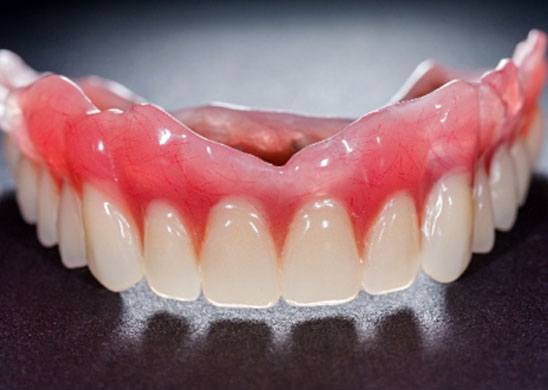 Multiple missing teeth can be a real burden for both your smile’s appearance and function, but fortunately, full and partial dentures can provide an effective, natural-looking, and cost-effective solution. Dentures, in one form or another, have been used for generations, and with the latest advancements in dental prosthetics, modern-day dentures are now smaller, sleeker, and more comfortable than ever. Whether you are missing a few teeth or a complete row, they could be exactly what you need to get your complete smile back.
Multiple missing teeth can be a real burden for both your smile’s appearance and function, but fortunately, full and partial dentures can provide an effective, natural-looking, and cost-effective solution. Dentures, in one form or another, have been used for generations, and with the latest advancements in dental prosthetics, modern-day dentures are now smaller, sleeker, and more comfortable than ever. Whether you are missing a few teeth or a complete row, they could be exactly what you need to get your complete smile back.
What Are Dentures?
Dentures can be used to restore multiple missing teeth in order to revitalize the smile’s appearance as well as improve a person’s eating and speaking ability. They are made of prosthetic teeth attached to a realistic-looking gum-colored acrylic base, and they come in three main types:
- Partial Dentures: These can be used to fill in the gaps in a person’s smile who still has remaining natural teeth. It basically fits among the teeth like a puzzle piece, and it’s held in place using small metal clasps.
- Full Dentures: These are used to replace an entire row of missing teeth. This type of prosthetic sits directly on the gums and is held in place using natural suction and/or a bit of denture adhesive.
- Implant-Retained Dentures: A denture can be secured using dental implants placed directly into the jawbone to provide maximum strength and stability. We generally recommend implant-retained dentures for patients who want ultimate function and longevity from their new teeth.
How Dentures Are Made

Are you interested in learning how dentures are made in Juno Beach? Most patients who pursue this type of tooth replacement are intrigued by the process that these prosthetics must go through in order to provide a natural-looking smile that works just like regular teeth. At Juno Beach Smiles, our team is here to give you some insight into what it takes to build your new and improved appearance.
What Are Dentures Made Of?
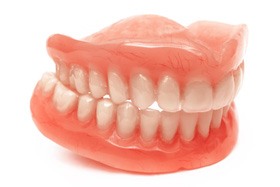
Dentures have two parts – the base and artificial teeth. Both are essential and work together to form cohesive, complete, and natural-looking smiles. Although the materials used to create the base and teeth can be different (i.e., resin, porcelain, metal, nylon), most laboratories and practices turn to acrylic when fabricating the foundational support.
When it comes to artificial teeth though, porcelain and resin are the go-to materials that dentists and patients love most. Not only do they mimic the natural look of tooth enamel, but they are durable and can withstand daily wear and tear.
When comparing full and partial dentures, the one factor that is different is how they’re held in place. Partials use metal clips that attach to regular teeth, while full dentures use suction.
The Denture Creation Process
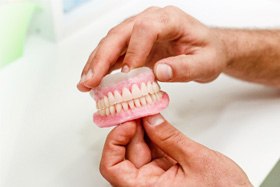
Creating your dentures is not something that takes just a few days. There are several steps that lab technicians must complete before providing you with your new and improved smile. With multiple fittings and adjustments required along the way, these are necessary to ensure a proper fit.
After capturing measurements of your mouth and jaw, impressions will be taken and sent to a lab. Using various materials to form the mold, wax dentures are created and sent to your dentist for you to try on. This will determine the fit, and you can expect to leave with a set of temporary dentures to wear in the meantime.
Over the next several weeks, lab technicians use specialized tools, boiling water, and plaster to build your dentures before the final creation is complete. Using gum-colored materials to mimic your soft oral tissues, the artificial teeth are put into place before a final polish gives them a beautiful, seamless look.
Adjusting to Your New Dentures

Wearing dentures takes a bit of time. An adjustment phase is to be expected since your mouth is not accustomed to this foreign object. Your lips, gums, tongue, and cheeks will need time to learn how to maneuver with your new teeth in place. With practice, you’ll no longer notice the lisp that may have formed initially, and you’ll begin to eat solid foods with greater ease.
The Benefits of Dentures

Unfortunately, losing multiple teeth can negatively impact your daily quality of life in several ways. You’re not able to eat or speak as effectively which can leave you hesitant to engage with others or attend social events. Plus, you could be so self-conscious about your changed appearance that you start to feel anxious or depressed. Thankfully, our dentists can provide lifelike restorations to rebuild your smile so you can once again enjoy your day-to-day experiences.
Keep reading to learn more about the many benefits of dentures, and feel free to contact us if you have questions or would like additional information!
Psychological Benefits

It can be emotionally and mentally difficult to accept the fact that you have permanently lost many or all of your teeth. Many people suffer a lack of self-esteem because basic tasks that used to be second nature, like talking and chewing, have suddenly become much more challenging. Plus, if you’re worried about how others will perceive you then you might avoid interacting with people which can cause feelings of sadness or isolation.
Dentures are a versatile solution that can rebuild your smile so that you can rebuild your sense of self. You’ll be much less anxious about spending time with people when you know you won’t be embarrassed by a lack of skill or a toothless smile.
Clearer Enunciation

Your teeth play an essential role in your ability to speak because you press your tongue on them in certain ways to enunciate a variety of sounds and words. Without them, it can be nearly impossible to speak in a way that others can clearly understand.
Once you’re fitted with dentures, you can begin the work of relearning this basic skill. It may take about a month for your tongue and mouth muscles to adjust to working around them so be patient with yourself during this time. Soon, you’ll be well-practiced and can confidently rejoin conversations with family and friends.
Improves Nutrition

Another primary function of your teeth is to help mash up the food you eat so that it can be easily downed and digested. If you’re not able to chew well because too many are missing then you could develop gastrointestinal issues from swallowing pieces that are too large. You’re also at an increased risk of malnutrition because you might stick to a more limited range of softer foods that are easier to eat.
Fortunately, dentures allow you to fully grind up a variety of foods so that you can once again enjoy a well-balanced diet that gives your body all the nutrients it needs to stay healthy.
Preserves Oral Health

When there are gaps in your grin, any remaining teeth will do their best to fill them. They could shift out of alignment which leaves them more vulnerable to injury. They’ll sustain uneven wear and tear from the frequent pressure of biting or chewing which can crack or break them.
Your dentures fill in the spaces so that any natural teeth left can remain in their correct positions to preserve your oral well-being.
Expands Opportunities

Studies show that one of the first things people notice about you is the quality of your smile, and a healthy one is viewed as an attractive feature. If you’re missing teeth, it might communicate that you don’t take care of yourself or practice proper oral hygiene. That’s not good news if you’re hoping for a promotion at work or have an exciting first date on the horizon.
Dentures are made to look and feel like your natural teeth so that you have a perfect grin to show off. You’ll feel confident in yourself and your abilities when you look and feel your best, which means you’re much more likely to be successful!
THE PROCESS OF GETTING DENTURES
If you’re looking to rebuild your smile, the first step is to schedule an appointment here at Juno Beach Smiles. Dr. Greg Riley or Dr. Duane Keuning will perform a short oral exam, and then they’ll discuss our multiple tooth replacement options. If you both decide that removable dentures are the best one for you, they can then start the process of creating your prosthetic.
Typically, it takes a few appointments spaced out over the course of a few weeks to get your final denture. This is because, during these appointments, your doctor will create a series of mock-up models for you to try on so you can determine the perfect look and fit for you. After you have found the model that suits you the best, it will be sent to a local dental lab to fabricate your final dentures. You’ll then return to Juno Beach Smiles where your dentist will fit them, make any final adjustments if necessary, and then talk to you about using and maintaining them.
Dentures Aftercare

Dentures are a life-changing tooth replacement option for people who are missing most or all of their teeth. It can take some time to adjust to them at first, but with a little practice, you’ll get the hang of it! Here are some steps that you should be taking with your dentures to ensure that they remain in good shape for as long as possible.
Removeable Dentures
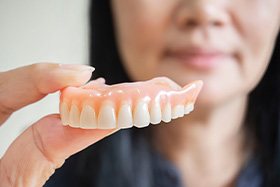
Remove After Eating
After finishing snacks and meals, you should take out your dentures and give them a rinse. This is to rinse away food debris and plaque on your prosthesis. When you rinse your dentures, make sure that the water isn’t too hot. High temperatures can cause the dentures to become warped, meaning that they will no longer properly fit you.
Clean Your Restoration
Remove your dentures to clean them. Using a soft-bristled toothbrush and a small amount of hand soap, mild dish soap, or denture cleanser, gently brush your dentures. You shouldn’t use regular toothpaste because dentures aren’t made of material that can stand up to abrasiveness. If you aren’t going to be wearing your dentures again right away, put them into a container of water or denture-cleansing solution so they don’t dry out and lose their shape. Remember to rinse your dentures thoroughly before putting them back in.
Keep Your Dentures Safe
When you clean your dentures, place a towel beneath them just in case you accidentally drop them. This may prevent them from becoming damaged. You should also always keep your dentures out of reach of pets and small children.
Remove Dentures While You Sleep
Take your dentures out at night when it’s time to go to bed. Wearing them restricts the circulation in your gums and can lead to soft-tissue irritation. Sleeping with dentures has been associated with a higher risk of pneumonia in addition to higher levels of gum and tongue plaque. Overnight, keep your dentures in a denture-soaking solution so they don’t lose their shape.
Notice Changes
Be on the lookout for changes so you can address them with your dentist. This includes mouth sores, gum irritation, or anything else that is bothering you. If you notice any shifting, clicking, or other signs that your dentures aren’t fitting properly, this is something you should bring up.
All-on-4 Dental Implants
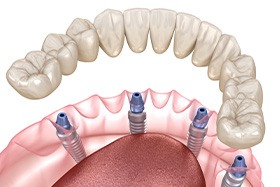
For all-on-4 dental implants, the process looks different. You should brush them with a soft-bristled toothbrush and non-abrasive toothpaste. Remember to also floss your replacement teeth every day. You may also want to consider investing in a water flosser. For extra freshness, use an antibacterial mouthwash.
Understanding the Cost of Dentures

Dentures are one of the most traditional tooth-replacement solutions for missing teeth. Not only can they improve your appearance, but they allow you to enjoy a complete bite once again. Of course, you likely want to know how much they’ll cost before moving forward with the process. Since every case is unique, it’s impossible to give an accurate price estimate until you come in for an exam. During your consultation, we’ll explain which factors influence the overall cost of dentures in Juno Beach and what you can expect for your specific situation.
Factors that Affect the Cost of Dentures

The cost of dentures in Juno Beach depends on a few factors, including:
- Whether you require a full or partial denture
- How many teeth must be replaced
- Whether you are receiving a traditional or implant-supported denture
- Whether you require any preliminary treatment, such as extractions
- The materials used to construct your denture
Patients on a budget may be tempted to get more affordable dentures. However, it’s important to remember that cheaper isn’t always better. These oral appliances are usually made from materials that break easily, meaning you’ll require a replacement much sooner than anticipated. For something that’s going in your mouth and will be used every day, it’s always best to invest in something long-lasting.
Are Implant Dentures More Expensive?

Yes, but there’s a very good reason for that. Implant dentures require oral surgery and the placement of multiple dental implants. As a result, they’re far more reliable for day-to-day use because they will stay firmly in place. Dental implants also help stimulate the jawbone, providing increased biting strength and longevity. Unlike traditional dentures, you won’t have to worry about replacing them every few years because implants can last decades with proper maintenance.
Does Dental Insurance Cover Dentures?

Most dental insurance plans offer some level of coverage for dentures in Juno Beach because they’re considered a major procedure. In most cases, you can expect to receive up to 50% of coverage. Of course, the exact percentage will vary from plan to plan. Before committing to anything, you should confirm the details of your coverage with your insurance provider. Our dental team is more than happy to assist with this process if needed!
Other Options for Making Dentures Affordable

Don’t have dental insurance? No problem! We offer additional financing options to help make your treatment as affordable as possible. Some of those include:
- In-House Savings Plan – For a reasonable annual or monthly fee, you can get all the care you need without having to break the bank. This plan allows you to enjoy the benefits of traditional insurance without the hassle of deductibles, waiting periods, and claim forms.
- CareCredit Financing – With this option, you can split up the total cost of your treatment into smaller monthly installments. Best of all, most payment plans come with little-to-no interest to help you save even more money.
Dentures FAQs
Are you ready to rebuild your smile with dentures? Your new prosthetic has the potential to boost your confidence, broaden your dietary options, and help you enjoy an improved daily quality of life. However, you may still have some questions about dentures that you would like to have answered before you schedule your consultation with us. That is why we have compiled the following list of FAQs. If you do not see the information you were hoping for, you are welcome to contact us directly so we can personally assist you.
How Long Do Dentures Last?
After you lose your natural teeth, your jawbone will change shape, and eventually, the changes will reach the point where relining (adjusting) the denture will no longer help it fit well. That is why a non-implant full denture may last for 5 – 8 years. A partial denture may last for 10 years or so before replacement becomes necessary. An implant-retained denture prevents changes to the jawbone and may therefore last for decades.
Are There Any Foods I Should Avoid with Dentures?
Traditional, non-implant dentures can enable you to eat a wide variety of foods. However, it is best to say no to extremely sticky foods because they could dislodge your denture. Foods with little seeds or other small, hard parts are also something to be cautious around. Those tiny particles could sneak beneath your prosthetic and irritate your gums. When you are eating tough foods, such as steak or raw vegetables, it is best to cut them before you put them in your mouth, then chew them evenly on both sides. Implant-retained dentures offer greater stability and require fewer precautions when you are eating.
What Should I Do if My Dentures Feel Loose?
A loose denture probably needs to be relined. However, it is also possible that your prosthetic has been damaged. Do not try to repair your denture by yourself, and do not wear a damaged denture. Contact us and describe your situation. We’ll do our best to solve the problem as quickly as possible so you can get back to enjoying your prosthetic.
How Soon After Extractions Can I Get Dentures?
The answer to this question depends on your unique circumstances. Some patients qualify for an immediate, temporary denture on the same day as their extractions. While this presents an extra cost, many people feel that the aesthetic advantages are worth it. Other individuals wait 6 weeks or longer before getting dentures so their gums have adequate time to heal. Your dentist will talk to you about all of your denture options when you visit us for your consultation.
HAVE ANY QUESTIONS?
If you’re ready to say goodbye to the gaps in your smile, dentures are one of the most reliable ways to do it. To learn more about dentures and see if they are right for you, please contact us today for an appointment.
